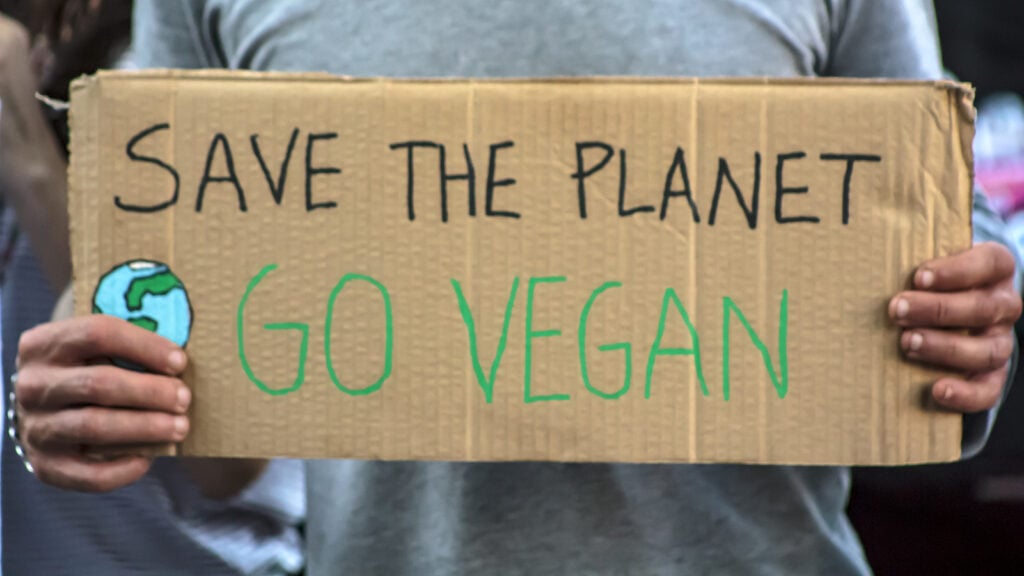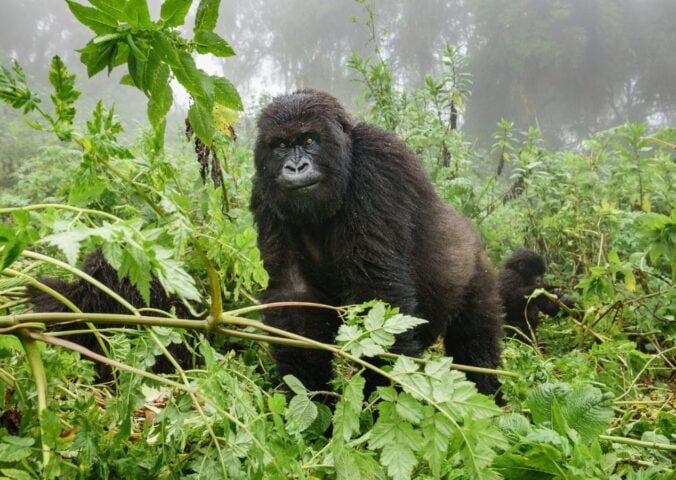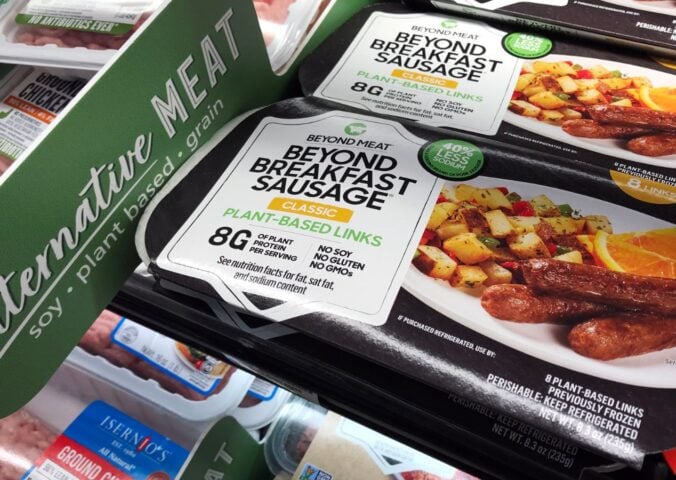You may have heard of Earth Day – but did you know the entire of April is also known as Earth Month?
Going vegan is one of the easiest and most effective changes you can make to help combat climate change and save the planet
So, without further ado, here are seven reasons to ditch animal products:
1. The climate crisis
Governments have joined together to try to limit the global temperature rise to less than 2°C, or ideally 1.5°C, above pre-industrial levels – a critical threshold above which there may be devastating consequences.
We have already broken through 1°C and are very close to reaching 1.5°C.
To avert an environmental disaster, we must take urgent action. Dr. Peter Scarborough from the University of Oxford says that going vegan could halve your greenhouse gas emissions from food.
Environmental researcher Joseph Poore, also from the University of Oxford, agrees. Poore assessed the impacts of food, from farm to fork, and found that going vegan could reduce your food-related greenhouse gases by up to 73 percent.
Poore said: “A vegan diet is probably the single biggest way to reduce your impact on planet Earth.”
2. Wildlife loss
We’re currently experiencing Earth’s sixth mass extinction. One million animal and plant species, more than ever before, are threatened with extinction, says the United Nations’ Intergovernmental Panel on Biodiversity and Ecosystem Services (IPBES).
Why does it matter? Bacteria, fungi, insects, birds, mammals, sea creatures, plants, and trees all make up complex ecosystems that work together to perform many essential ‘services’ such as nutrient recycling, soil generation, pollination, seed dispersal, and much more.
The air we breathe, the water we drink, and the food we eat all depend on rich biodiversity.
IPBES Chair, Sir Robert Watson, said: “The health of ecosystems on which we and all other species depend is deteriorating more rapidly than ever.”
However, scientists agree, there is still hope if we act now.
3. Deforestation
Known as the lungs of the world, forests take carbon out of the atmosphere and release oxygen – we lose them at our peril!
Trees store carbon in their branches, trunks, and roots but also in leaf litter and forest soil. It is slowly released when they die and rot.
However, when vast expanses of forest are felled and burnt – slash and burn deforestation – huge quantities of carbon re-enter the atmosphere almost overnight.
Animal agriculture is the biggest driver of deforestation as forests are cleared to make way for growing animal feed (soya) and grazing.
According to satellite data from the University of Maryland, an amount of pristine tropical rainforest equivalent to the size of a football pitch was lost every six seconds during 2019.
4. Land use
We’re running out of space to grow food for the world’s expanding population yet a third of the world’s cereal crop is fed to animals so that some people can eat meat, fish, and dairy.
It’s a grossly inefficient use of land and other resources. Poore says that meat, fish, eggs, and dairy use around 83 percent of the world’s farmland but only provide 37 percent of the protein we eat and 18 percent of calories.
If meat consumption continues to grow, by 2050 global food production will need to increase by 70 percent to meet demand. There simply isn’t enough land for this to happen.
In Europe, we can grow enough vegetable protein to feed all the people here. But, not enough to feed all the animals we eat.
As a result, soya and other crops are imported for animal feed from places such as the Amazon rainforest– linking steaks and burgers directly to deforestation.
5. Marine life
Overfishing, increasing acidity, and rising sea temperatures are having a devastating impact on marine biodiversity.
The United Nations Educational, Scientific and Cultural Organisation (UNESCO) says that ‘by the year 2100, without significant changes, more than half of the world’s marine species may be on the brink of extinction’.
Increasing acidity, caused by rising carbon dioxide levels, is dissolving the shells of some sea creatures making their survival unviable.
Rising sea temperatures are killing coral reefs and increasing the risk of flooding for up to 300 million people.
Phytoplankton (microscopic marine algae) are declining at around one percent every year, according to NASA satellite data. These little microorganisms take carbon dioxide from the atmosphere and produce around 50 percent of all the oxygen on Earth.
If this continues, it won’t just be phytoplankton getting into hot water!
6. Food waste
The Food and Agriculture Organisation of the United Nations says that around a third of all food is thrown away.
Moreover, in the UK alone, the average family throws away £700 worth of perfectly good food every year.
Squandering any food is wasteful but when meat, fish, dairy, and eggs are thrown away, all the grain and water used to produce them is wasted too.
Unsustainable animal food production is bad enough, without producing it just to be discarded. Food isn’t rubbish and doesn’t belong in landfill.
Saving food means you’ll be contributing to a better legacy for generations to come. Going vegan and saving food? Now that’s a legacy to be proud of.
7. World hunger
Moreover, around 700 million people around the world go hungry every year. It’s also estimated that a staggering three billion people cannot afford a healthy diet.
If we cut out the middleman and ate crops ourselves instead of feeding them to animals, we could feed an additional four billion people. That’s more than enough for everyone for many years to come!
We all know how wasteful old gas-guzzling cars are – how long before livestock farming is viewed in a similar way?
In evolutionary terms, humans were late to the party but our arrival has certainly been felt, from one side of the planet to the other.
Take action this Earth Month
We urgently need action rather than targets, goals, and empty words. We know what needs to be done. What’s lacking is the political will to adopt a new approach and a genuine commitment to pursue it. Stand up for nature and go vegan today!
Please share one reason per day for seven days on your social media platforms!
This article has been republished with permission by Viva! You can read the original piece here






